Loaves & Fishes feeds the Bay Area’s hungry from South Valley kitchens
Need is getting greater every year as nonprofit now serves an average of 12,000 meals each week
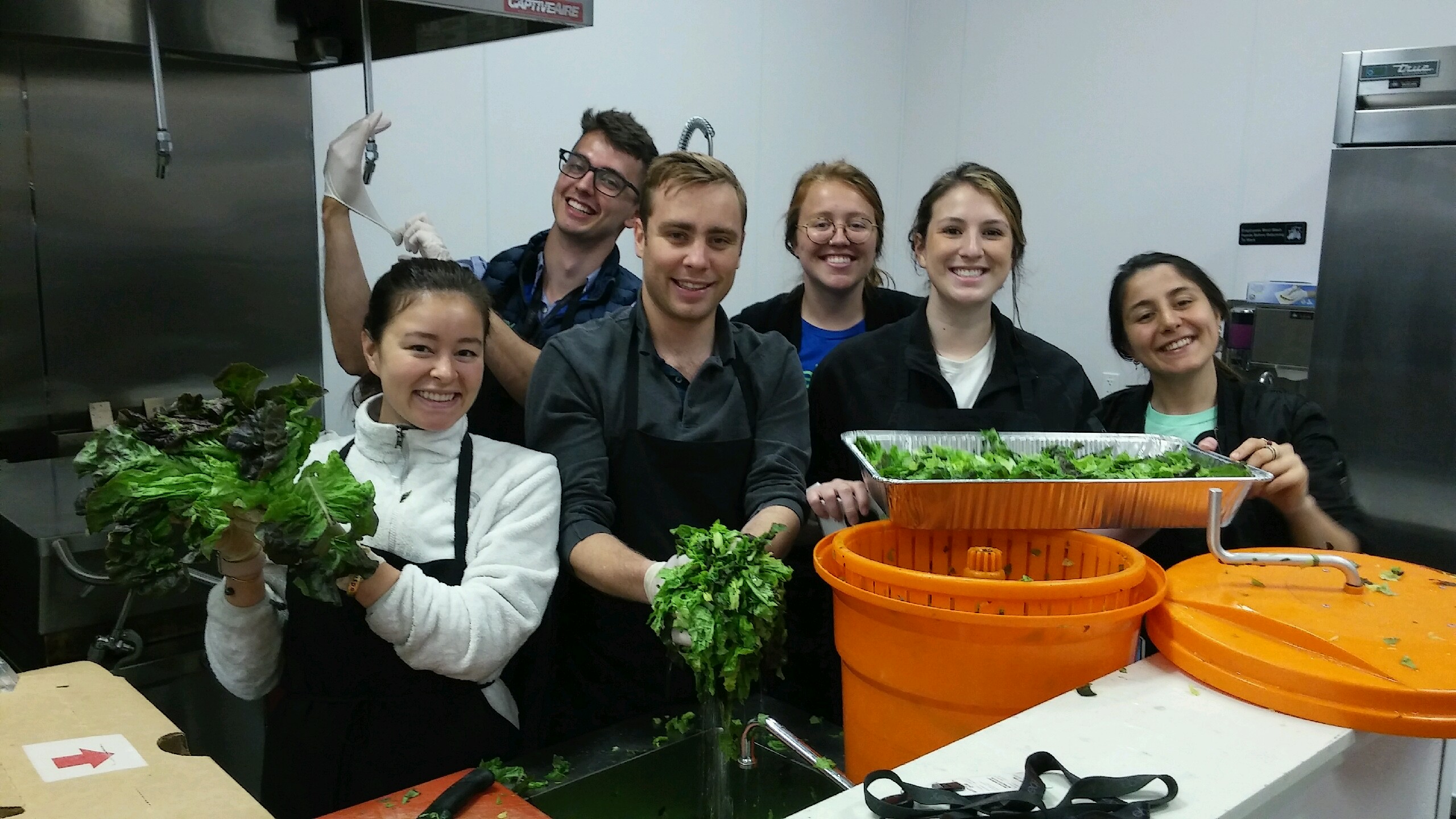
Photo courtesy Anne Santos with Loaves & Fishes
A group of volunteers from eBay help prepare meals at Loaves & Fishes kitchen in Morgan Hill.
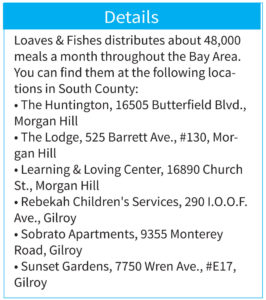 A growling stomach can distract anyone, especially schoolchildren. But for many, it’s a daily occurrence. Since 1980, Loaves & Fishes has provided hot, nutritious meals to hungry Bay Area residents. Their noble efforts make an immeasurable difference to those they serve. And they do it quietly from South County.
A growling stomach can distract anyone, especially schoolchildren. But for many, it’s a daily occurrence. Since 1980, Loaves & Fishes has provided hot, nutritious meals to hungry Bay Area residents. Their noble efforts make an immeasurable difference to those they serve. And they do it quietly from South County.
Loaves & Fishes operates two centralized kitchens in Morgan Hill, at the Huntington and the Lodge, located on Butterfield Boulevard. In this extended partnership model, they rent workspaces for $1 per year, plus utilities, in exchange for providing meals to the residents. When their temperature-controlled delivery trucks arrive each weekday, they pack nutritious meals for distribution from Gilroy to South San Francisco. Their fleet brings an average of 12,000 meals per week to those who may not otherwise eat.
“Because of the kindness of the folks who manage the Huntington, we’re delighted to feed all the residents of the Huntington and the Lodge,” said Gisela Bushey, Loaves & Fishes CEO. “We’re cooking anyway. It’s been six years and it’s a lovely partnership. Everybody wins. This is something purposeful and purpose driven. As my mother would say, it’s a happy byproduct.”
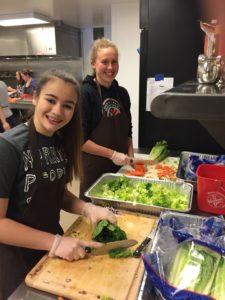 Bushey knows firsthand what it’s like to be hungry, having experienced poverty as a child while her father was serving in Korea. A single financial setback led to her family losing their home, a circumstance she sees repeated all too often.
Bushey knows firsthand what it’s like to be hungry, having experienced poverty as a child while her father was serving in Korea. A single financial setback led to her family losing their home, a circumstance she sees repeated all too often.
“We don’t realize how the vast majority of people in this country are just one incident away from tipping into homelessness,” Bushey said. “Only about 10 percent of our guests are considered chronically homeless. The vast majority are from the local community who, because of circumstances, find themselves without a home or secure place to live. Many are working multiple jobs and still can’t make ends meet.”
Suddenly, they’re trapped in a frustrating cycle. Their car needs gas to get to work. But they need to eat and feed their family. Buying food means they can’t pay for gas to continue working and earning money. They need to make hard financial choices.
Bushey’s passion and enthusiasm for helping those in need is genuine, having never forgotten the kindness shown to her own family. “If we can at least help them pause for a moment and ensure they have a nutrition-packed meal for themselves and their family, we can create a space where they can focus on not worrying, not being alone, not having that social isolation.”
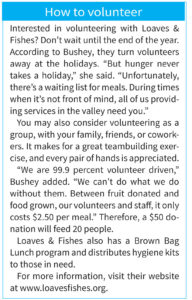 To bring people together, all meals are served family style. Because it’s likely to be their only meal, it meets 100 percent of nutritional requirements, including protein, carbohydrates, fresh fruits and vegetables as they are available, milk, and water. Bushey notes one of the first things guests ask for is a salad. Thanks to donations from local South Valley growers, they’re able to provide fresh, organic produce.
To bring people together, all meals are served family style. Because it’s likely to be their only meal, it meets 100 percent of nutritional requirements, including protein, carbohydrates, fresh fruits and vegetables as they are available, milk, and water. Bushey notes one of the first things guests ask for is a salad. Thanks to donations from local South Valley growers, they’re able to provide fresh, organic produce.
Silicon Valley is an epicenter of economic wealth. A glance at real estate prices and the number of luxury cars on Bay Area freeways will support that fact. Yet for each McMansion in suburbia and every BMW in the commuter lane are hungry mouths and discouraged hearts. But while it seems there might be an extreme disparity in the distribution of wealth, the difference between the haves and the have nots is closer than you’d think.
Bushey said the homeless population has gone up 31 percent in Santa Clara County since last year. That’s not counting the 375,000 people in Santa Clara County who don’t know where their next meal is coming from. There are an estimated 730,000 homeless individuals in San Mateo and Santa Clara counties, the regions Loves & Fishes serve. Many of them are people seen on the streets every day.
“You already have them,” Bushey said. “They might be couch surfing, doing what circumstances dictate. But these are neighbors, families, seniors, veterans, and students. San Jose State University alone has 6,000 homeless students. About 25 percent of our guests are veterans. Sadly, one third are children. And, one third are seniors. It’s worse than the national average. For a region that wants to be on the cutting edge, we are the third largest center of homelessness and hungry. Those are lists we don’t want to be at the top of, let alone even be on. Surely we can do better.”
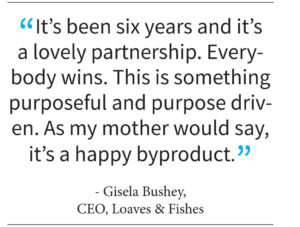 And those numbers keep rising. In the past four years, Loaves & Fishes has increased and streamlined services to accommodate the growing number of residents needing hot meals and support, not just on major holidays. They partner with 30 nonprofits to provide meals at low-income senior retirement centers, community centers, schools, and after-school programs. All are welcomed, no questions asked.
And those numbers keep rising. In the past four years, Loaves & Fishes has increased and streamlined services to accommodate the growing number of residents needing hot meals and support, not just on major holidays. They partner with 30 nonprofits to provide meals at low-income senior retirement centers, community centers, schools, and after-school programs. All are welcomed, no questions asked.
Homelessness and hunger can have negative effects on an individual’s mental health and self-esteem. “You don’t have to be defined by this,” Bushey said. “It can be all consuming just to make it through the day. How do you talk about hope when you’re hungry, and the future feels so insecure?”
That hope rises in the goodness of others, committed to serving as their brothers’ and sisters’ keepers. “The blessing for us is that as we’ve seen numbers of guests continue to tick up, we’ve also seen numbers of volunteers go up,” Bushey said. “It can, in a very meaningful way, make a transitional difference.”
 For the most part, this may be the only kindness they get in a day and the only meal they’ll get in a day, she said. The hands and hearts that serve it may provide the only kindness they experience as well.
For the most part, this may be the only kindness they get in a day and the only meal they’ll get in a day, she said. The hands and hearts that serve it may provide the only kindness they experience as well.
“It’s not just about enjoying a hot meal. It’s about doing that in as welcoming and respectful and dignified and kind way as they can,” she said. “When you do things for the sake of the community, we are all lifted up.”
Hunger and homelessness are ruinous challenges for many people in the South Valley. Where one goes, the other often follows.
Yet there’s a simple solution, Bushey said. “We do one thing and, as simple as that is, it’s also that profound,” she said. “If they come to our door, and they’re hungry, we’re going to feed them.”
